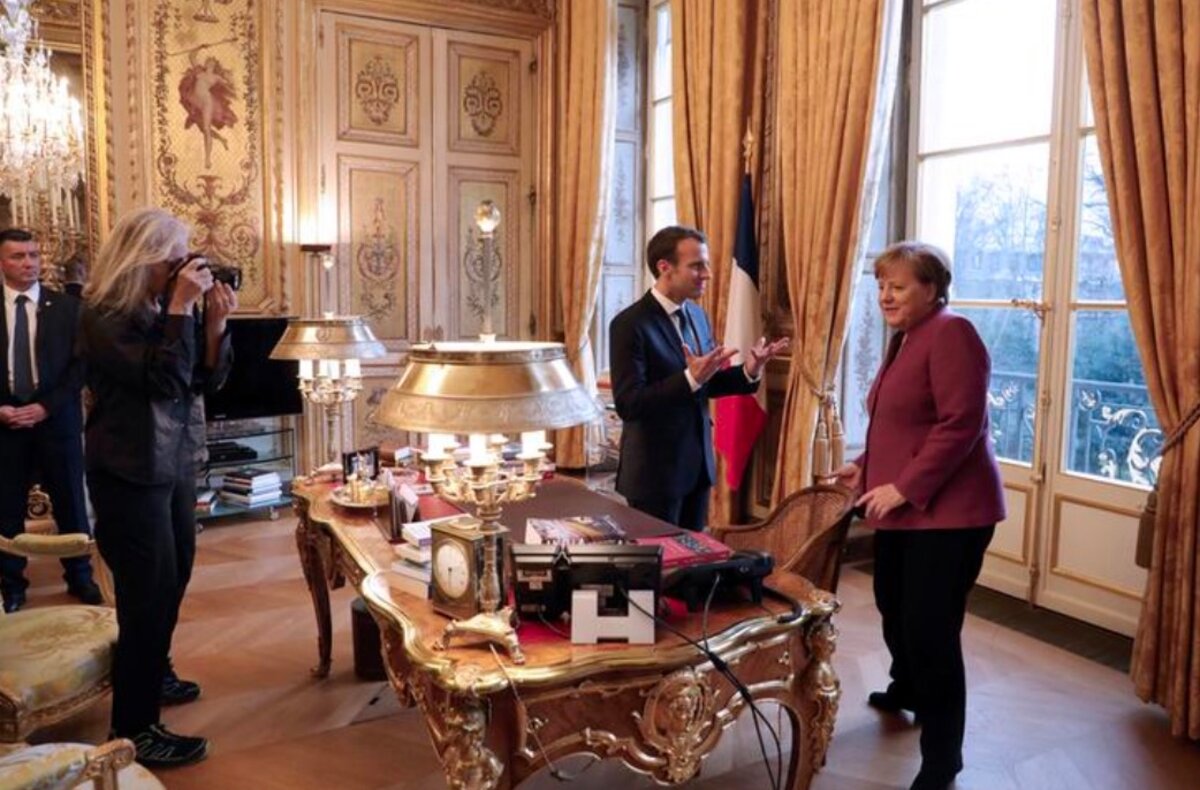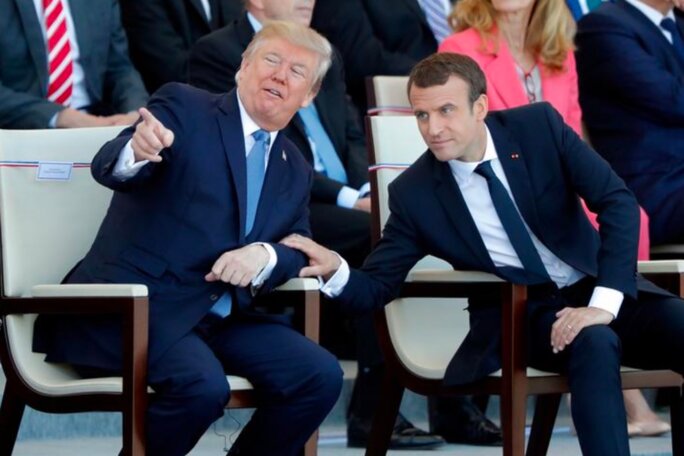On the eve of his state visit to the Unites States, Emmanuel Macron opened up the doors of the French presidential office, the Elysée Palace, to the US edition of Vanity Fair. The resulting feature, illustrated with flatteringly photos by celebrated photographer Annie Leibovitz, was entitled “Emmanuel Macron opens up about Iran and his new pal at the West Wing”.
What the magazine calls his new “pal” is of course Donald Trump, whose invitation to Macron is the first state visit of a foreign leader since he entered the White House in 2017. Over three days beginning on Monday, Macron will be feted on the international scene, leaving behind him the rolling demonstrations and strike action against his programme of structural reforms of the public sector.

Enlargement : Illustration 1

Speaking before the European Parliament last week, Macron warned against a “fascination with the illiberal” among some Europe Union member states in reference to nationalist and populist political movements. He drew applause from the assembled MEPs when he stressed that democracy “is a word with meaning, which emerged from the battles of the past".
Now, with his three-day visit to the US, the French president will be aiming to polish the perceived image he likes to promote, that of the young head of state who blew away his country’s traditional political scene, the man who put the brakes on France’s rising wave of populism in the wake of the Brexit in the UK and Trump’s arrival at the White House, who has launched the structural reforms demanded by international institutions and who stands as a bulwark against the anti-democratic slide in Europe and elsewhere.
This week's trip to the US is Macron’s first state visit to a country since he came to power in May last year, as well as also being the first such visit of a foreign leader to the US since Trump came to office in January 2017.
In pre-trip press briefings at the Elysée Palace, officials described the invitation made to Macron as being the sign of “the extraordinary history of friendship and alliance over 250 years” between France and the US. Both Paris and Washington trumpet the excellent cooperation between the two on military and anti-terrorist affairs, and the Elysée officials, speaking on condition their names were witheld (now normal practice in such briefings), claimed that the red-carpet reception for Macron is another indication of the “close and trusting relations” he maintains with Trump.
Whilst he hardly appears to have anything common with the US president, Macron told Vanity Fair of his “very personal relationship” with Trump. "We have developed a good level of trust and respect,” said Macron, adding, “We talk on the phone on a regular basis”, and that he appreciated “the forthright conversations”.
From the beginning, the French president has employed a hot-and-cold ambiguity in his dealings with Trump. There was the test of strength with the very public, and excruciatingly long, handshake between the two men when they first met on the sidelines of a NATO summit in Brussels last May, when Trump was finally out-played in the machismo hand-gripping stakes. After Trump announced he was pulling the US out of the Paris COP 21 accords to combat climate change, a troll-like Macron released a video online promoting the December 2015 UN deal with the slogan “Make our planet great again”, borrowed from Trump’s campaign chant of “Make America great again”.
But then Macron made Trump the flattering invitation to join him in France’s annual Bastille Day military parade ceremony on the Champs Elysée last July, when the two leaders and their wives dined at the Eiffel Tower. More recently, Macron claimed to have convinced Washington that US troops should continue to remain in Syria, despite Trump’s comments that they would soon be pulled out. Macron was forced into retreat with a more nuanced clarification of his claim, but it was another example of how he seizes opportunities to take advantage of his US counterpart.
Interviewed on the US channel Fox News on Sunday, Macron again insisted on his “special” relationship with Trump, underling that both of them were non-conformists who are not from the traditional political system, and he was careful not to mention Trump’s many legal and political woes. The broadcast was no doubt pleasing for Trump, who is known to be an avid viewer of Fox News – which some dub Trump TV – where he counts a number of allies.
The two men and their wives dines at Mount Vernon, the Virginia plantation house of the first US president George Washington, on Monday evening. On Tuesday the presidents will hold meetings at the White House before lunch at the State Department followed by a visit to the military cemetery at Arlington. Tuesday evening will be marked by a grand state dinner in the presence of leaders of the Republican party, a first such occasion for trump which will break with past tradition for state visits by shunning figures from the opposition and the media who are usually also present.
One of the highlights of the trip will be a speech Macron will give in English before Congress on Wednesday, an event the Elysée Palace insisted was “extremely rare”. In reality, all recent French presidents bar Macron’s predecessor, François Hollande, have done so, although Valéry Giscard d’Estaing, France’s centre-right president between 1974 and 1981, was the only one to have addressed Congress in English. In his speech, on the 200th anniversary of American independence on May 18th 1976, he extolled the virtues of “liberal society”, which he said was “the best society”.
The French presidential staff said Macron’s half-hour speech will be the opportunity to send “a message of friendship, of respect, of affection from the French people to the American nation”.
“We are confronted with challenges of unequalled complexity,” added an Elysée official. “The question that will be raised during this speech before Congress will, finally, be ‘do you want to continue to write history together?’.”
According to the Elysée, Macron does not intend to become involved in discussing internal US politics, nor to lobby the US against withdrawing from the 2015 deal with Iran to curb its nuclear development programme, which Trump has mooted he may decide to pull out of this May. But on agreed international measures to limit climate change, Macron’s office said he will be putting the issue back “at the centre of conversations” although, one Elysée official tempered, “we’re no longer in the situation of looking at bringing the US back within the [COP 21] Paris agreement”.
'Fate of the Western alliance is in Macron’s hands'

Enlargement : Illustration 2

Macron is above all hoping to mark points in terms of his image. His victory last year over far-right candidate Marine Le Pen in the final round of the French presidential elections was regarded with relief by the broad political swathe of opposition to Trump in the US, including, beyond the Democrat camp, the neoconservatives, moderate Republicans liberals and progressists. After the British referendum vote in June 2016 against continued membership of the European Union, and the November 2016 election victory of Trump, the election of Macron was seen across the Atlantic by those outside of the US president's camp as a welcome, and at least temporary, halt to the rise of nationalism and populist politics.
In a country where calling oneself leftwing or a socialist is to be situated on the margins of mainstream politics, (even if that is an evolving situation, notably with the 2016 campaign of Bernie Sanders), and the term “populist” is often applied to those on the Left of the Left. Yascha Mounk, a lecturer on Political Theory at Harvard University's government department, who manages a podcast called The Good Fight in which regularly feature mainstream Trump opponents, argues in his recent book The People vs Democracy that the likes of the leftist Podemos movement in Spain, France’s radical-left La France Insoumise (France unbowed) party leader Jean-Luc Mélenchon and European far-right movements are two sides of the same coin. For him, Macron not only halted Front National leader Marine Le Pen’s march towards power, but also avoided the scenario, which was at one point in the French elections viewed as possible, of a final round playoff between Mélenchon and Le Pen, which he argues would have been a “nightmare”.
In the US media, and notably the financial and economic press, Macron, whose liberal economic policies are largely in tune with the establishment within the Democratic Party, is very often viewed as the French president who will at last lead perceived necessary structural reforms in his country. While Donald Trump, elected on a protectionist programme, has opted for trade wars, the conservative business daily The Wall Street Journal saluted Macron in a headline last week for “saving globalism from itself” with his championing of free-trade policies.

Enlargement : Illustration 3

Amid the current context of international crises, the weakening of Western democracies and the stances of more or less dangerous autocrats, Macron’s actions are well received among many US media commentators. William Drozdiak, a former Europe correspondent for The Wahington Post, last week wrote of how, while German Chancellor Angela Merkel reaches the “twilight” of her career and Britain is preoccupied with the Brexit procedure, “The fate of the Western alliance is in Macron’s hands”.
Macron, wote Drozdiak, “has moved into the political vacuum left by the retreat of the United States after seven decades of global dominance”.
“According to diplomats in several countries, Macron personally coordinated the expulsions of Russian diplomats from Western countries following the use of a nerve agent to poison Sergei Skripal, a Russian former double agent living in Britain,” he added. With China and India, Macron “sought to build a new strategic dialogue for Europe”.
For Politico, widely-read in Washington, the French president is “the new leader of the free world” and “something of a beacon for progressives hoping to find their way back to the halls of power across the democratic world”.
During his appearances with Trump this week, Macron will have little difficulty in coming across as the most attractive of the two leaders. Seemingly almost daily, Trump is appointing opportunists and hard-right figures within the various echelons of government, while counter-attacking the vast FBI investigation into his election campaign, and launching a purge of officials he regards as opponents. While threatening to claim the head of his justice chief, he recurrently takes to Twitter with messages attacking different social groups and the press, opposes abortion and leads a fierce campaign against immigrants. All of which has prompted federal judges to warn of a climate of “tyranny”.
In his recently published book A Higher Loyalty: Truth, Lies and Leadership, about his experiences with the Trump administration, former FBI director James Comey, who was fired last year by Trump, likens the Trump presidency to a “forest fire”.
"This President is unethical, and untethered to truth and institutional values," writes Comey, adding that, "His leadership is transactional, ego-driven and about personal loyalty".
In its April edition, the venerable Harper’s Magazine published an essay entitled “Four more years” warning of the possibility of Trump’s re-election in 2020. “I paint a gloomy picture here, I admit,” writes the magazine’s regular columnist, Thomas Frank. “If the economy zooms, I have conjectured, Donald Trump has a good chance of being reelected.”
Within this context, Emmanuel Macron has only to smile, put on the charm, and appear a tad spiritual for his visit to hoist his image further, his preferred role, far from home and social unrest.
-------------------------
- This is an abridged version of an article originally published in French here.
English version by Graham Tearse


